Can I Use Flex Seal to Repair My Roof Leak?
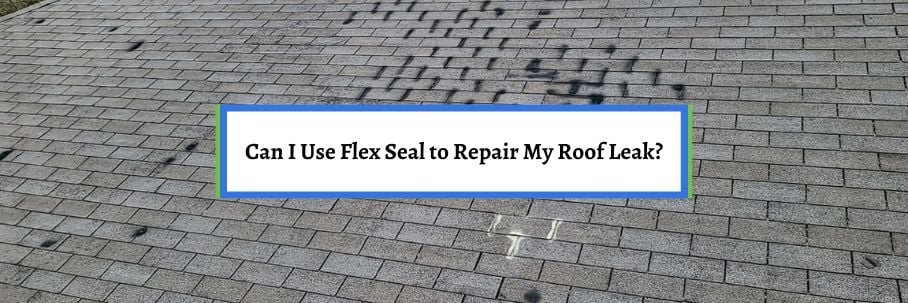
We’ve all seen the commercials with the Flex Seal guy sealing a screen door on the bottom of a canoe without sinking. While this is cool and great marketing, it’s not the full picture of the product.
However, it’s enough to convince people that they can use it anywhere in their home to stop water from getting in. So, of course, this inevitability led to homeowners using Flex Seal to repair their roof leaks.
You’re probably thinking, “You’re a roofing contractor, so you’ll just tell me not to do it.” While that’s partially true, it’s ultimately your decision to make.
For over 30 years, the team at Bill Ragan Roofing has provided transparent roofing advice to homeowners so they can make the right decisions on their own. That’s why I want to help you understand how Flex Seal impacts your roof.
I’ll start this article by simply answering if you can and should use Flex Seal to repair your roof leak. After that, you’ll learn the 4 warnings when using Flex Seal on your roof.
Can you use Flex Seal to repair your roof leak?
Simply put, yes, you can use Flex Seal on your roof. However, I won’t say it repairs your roof leak because that’s just not true (more on this in a minute).
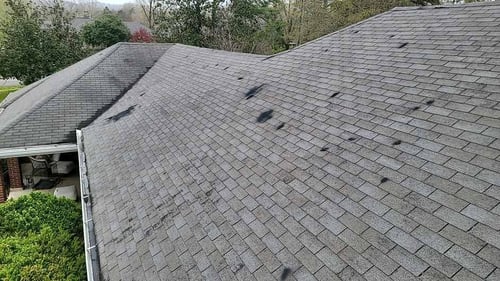
While you can use it on your roof, the question is should you? Honestly, no reputable roofer will recommend using Flex Seal to repair your roof leak.
But at the end of the day, your roof is your property. So, it’s completely your decision to use Flex Seal to repair a roof leak.
Look, I get the roofing industry has a horrible reputation and has lost the trust of most homeowners. So, I understand the hesitancy to call a professional when you think they’ll try to sell you a roof instead of taking care of the leak.
However, using Flex Seal to repair a roof leak has consequences you must consider.
4 warnings when using Flex Seal to repair your roof leak
As I just said, there are consequences to consider when using Flex Seal on your roof. So, before jumping on your roof and spraying away, you need to know 4 warnings when using Flex Seal to repair your roof leak.
1. You void warranties once you spray Flex Seal on your roof
You have two types of roof warranties to protect against potential problems. You’ll have one on your roofing contractor’s workmanship and one on your asphalt shingles from the manufacturer.
As soon as you start using Flex Seal to repair your roof leak, you void both warranties. You may be doing your own repair because your workmanship warranty expired or the roofing contractor is no longer around.
You’re obviously not voiding the workmanship warranty in this case. But some homeowners try to do the repair, fail to fix the leak, and then try to fall back on the roofing contractor’s warranty.
Anytime you mess with their work, you void the roofing contractor’s warranty. Similarly, you’ll void the manufacturer’s material warranty on the section of asphalt shingles with the Flex Seal.
This is simply because there's no way to prove a material defect or poor workmanship caused the roof leak when you mess with the impacted area. That’s why you should look at your warranty information to see if you’re still covered and take care of the leak professionally before using Flex Seal to repair your roof.
2. Flex Seal isn’t good for asphalt shingles
The next warning is that Flex Seal isn’t good for asphalt shingles. Flex Seal is UV resistant, but it’s not UV stabilized.
This means it’ll dry out and crack the longer it’s exposed to the sun, which is a lot of exposure since you’re putting it on the roof. Once the UV decays the Flex Seal, it’ll also crack the shingles or areas where it was put.
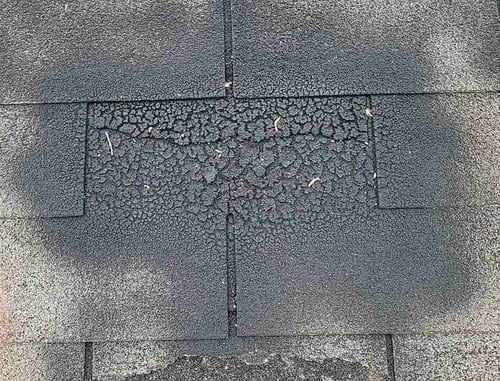
Because of this, you’ll have to keep resealing the area to avoid a leak. This makes the original 1/4″ hole turn into a 1″ patch, then a 3″, and so on, with it growing as the Flex Seal rots the surrounding areas and continuously wears out.
But don’t take my word that it’s not meant for asphalt shingles or recommended for roofing contractors to use. Their own FAQ states this interesting tidbit:
“Flex Seal [not affiliated with GAF] is not intended for use by Professional Roofers.”
That’s a direct quote from the FAQ page. If it worked as well as they or others say, then why wouldn’t the professionals use it?
I also highly doubt they would use this product on their own roof if they don’t recommend it to roofing contractors. I’m not saying to avoid sealing products or trying to do it yourself, but there are seals meant for asphalt shingles specifically.
So, do more research to find the right one, and don’t risk putting Flex Seal on your asphalt shingle roof.
3. Flex Seal will only be a temporary solution to a roof leak
I understand saving money where you can by doing a DIY roof repair is tempting. But using Flex Seal to repair a roof leak is just a temporary solution.
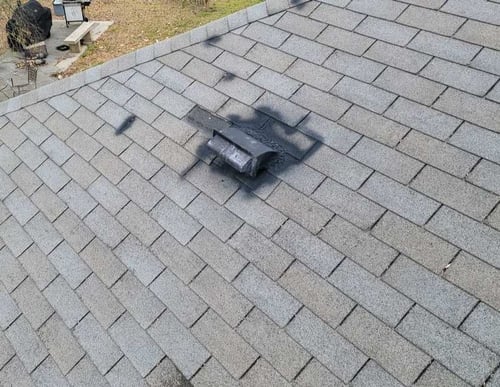 (Flex Seal around a vent damaging surrounding shingles)
(Flex Seal around a vent damaging surrounding shingles)
All you’re doing is covering up an issue that’s not resolved and ruining the shingles at the same time. And remember, the UV decay means you’ll have to continue applying to avoid leaking in the future.
So, while the short-term solution is tempting, you’ll spend more on repairs because the Flex Seal ate away at the surrounding areas as well as the original leak. If you still want to do the DIY work, you’re better off using a roofing-specific sealant as both a short and long-term solution.
4. Using an abundance of Flex Seal lowers your home’s curb appeal
Curb appeal is the visual attractiveness of a home from the street. Curb appeal is subjective and varies by the tastes of each individual.
Some homeowners don’t care about how their home or roof looks. However, it does matter to a lot of homeowners.
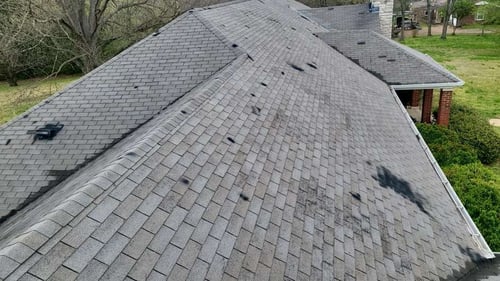
This brings us to the last warning, using an abundance of Flex Seal lowers your home’s curb appeal. How much it stands out depends on the color of your shingles and the amount you use.
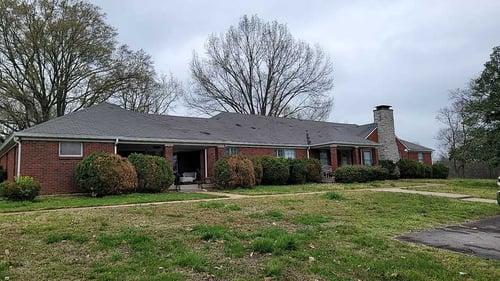
However, a bunch of little black dots or whole areas of blacked out shingles look terrible. That may be my opinion, but look at the images above and ask yourself if you would be ok with seeing that every day.
As I said, this is all subjective. If curb appeal isn’t important to you, at least consider the other warnings in this article before using Flex Seal on your roof.
Should you do a DIY roof repair or hire a professional?
Now you know the 4 warnings when using Flex Seal to repair your roof leak. Your roof is your property, so it’s ultimately your decision whether or not to take this advice.
But remember, doing this voids warranties, damages the asphalt shingles, and lowers your home’s curb appeal. You also won’t be taking care of the root cause of your roof leak by putting on a Flex Seal band-aid.
If you’re seriously considering doing your own DIY roof repair, find a roofing-specific solution. But before diving into DIY roofing, there are some things you need to consider.
That’s why I wrote another article to help you understand what you’re about to get into and the potential pitfalls.
Check out DIY Roof Repair: Should I Hire a Roofer Instead of Doing It Myself to learn if a DIY roofing project is worth it.


